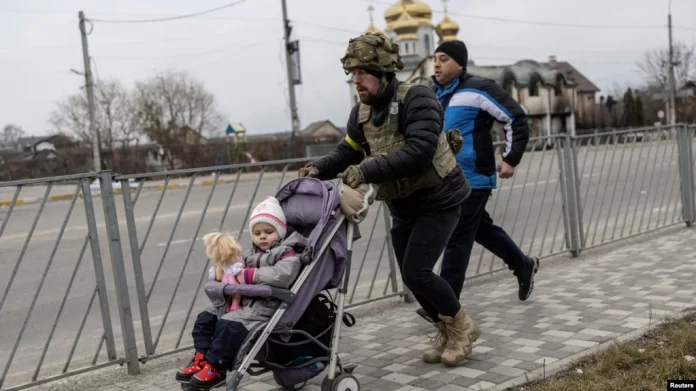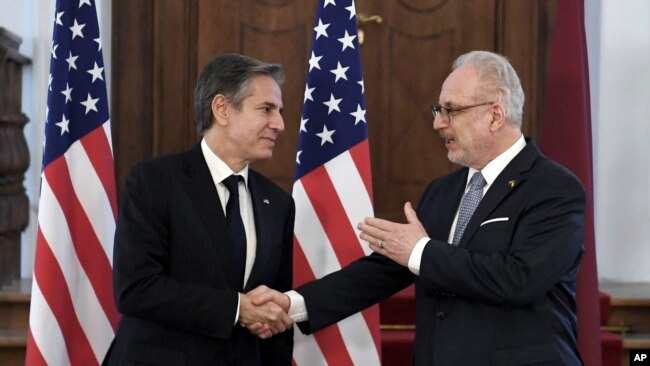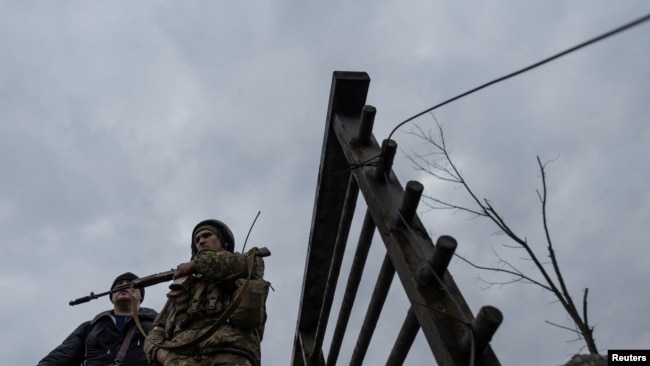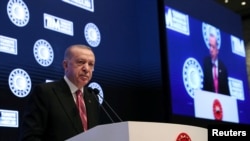An adviser to Ukrainian President Volodymr Zelenskyy said a small amount of progress had been made during a third round of talks Monday between Ukrainian and Russian negotiators.
The talks discussed establishing safe corridors that would allow civilians to flee the war, but Mykhailo Podolyak said there was no major breakthrough that could help end the conflict.
“There were some small positive shifts regarding logistics of humanitarian corridors,” Podolyak said, but he gave no further details following the talks in Belarus.
Russia announced another limited cease-fire Monday to allow Ukrainians to leave some besieged cities, after efforts to set up a safe passage for civilians fell apart over the weekend.
However, there was no indication Monday night that Russian shelling in Ukraine had stopped.
A Russian negotiator said Russia expects another round of talks with Ukraine to take place soon.
“The next, fourth, round will take place in Belarus in the very, very near future,” Russian negotiator Leonid Slutsky told Russian state television. “I will not name the exact date yet. It will be determined, perhaps tomorrow.”
Ukrainian officials had earlier slammed Moscow’s proposed civilian evacuation routes to Russia and Belarus and requested that civilians fleeing the battle zones be allowed to reach western Ukraine or European Union countries.
In a tweet minutes before the latest talks, Podolyak denounced Russia’s “large-scale violence against civilians.”
Ukrainian and Russian delegations have met three times in Belarus since Russia invaded Ukraine on February 24.
On the diplomatic front, U.S. Secretary of State Antony Blinken urged Russia to end attacks on civilians.
“Let the food and medicine in. Let the people out safely, and end this war of choice against Ukraine,” Blinken said during a news conference with Latvian Foreign Minister Edgars Rinkēvičs in Riga. Blinken cited “relentless bombardment” and reports of attacks by Russian forces on agreed-upon humanitarian corridors.
While in the Latvian capital, Blinken also met with Israeli Foreign Minister Yair Lapid who told reporters, “Israel is totally committed to do everything possible to stop the war in Ukraine.”
Blinken thanked Israel for its efforts to end the war and said the United States is working with its close partners and allies to try to find a solution that gives the Ukrainian people “their sovereignty, their independence and their territorial integrity.”
Blinken’s meeting with Lapid comes a day after Israeli Prime Minister Naftali Bennett spoke with Russian President Vladimir Putin and Zelenskyy separately in an effort to mediate a cease-fire.
Blinken is heading to Paris on Tuesday. His meeting with French President Emmanuel Macron would come after the latter’s diplomatic outreach to both Putin and Zelenskyy.
“There’s certainly no change in our message to Moscow, our message to Russia, to President Putin: End the war. End it now,” urged Blinken.
The White House said President Joe Biden held a video call Monday with the leaders of France, Germany and Britain to discuss the situation in Ukraine.
“The leaders affirmed their determination to continue raising the costs on Russia for its unprovoked and unjustified invasion of Ukraine,” according to the White House.
White House press secretary Jen Psaki said the leaders discussed the possibility of imposing a ban on importing oil from Russia. She said Biden has not yet decided whether to take such an action.
“No decision has been made at this point,” she told reporters, while adding that European countries have “different capacities and capabilities.”
On the ground, Russian forces bombarded cities in northern and southern Ukraine on Monday, as Ukrainian officials warned that Russia may be moving closer to storming Kyiv.
Ukraine’s General Staff of the Armed Forces said Russian forces were focused on encircling Kyiv, Kharkiv, Chernihiv, Sumy and Mykolayiv. A statement Monday accused Russia of violating international humanitarian law by shelling civilians and of creating a humanitarian crisis in occupied areas.
A senior U.S. defense official told reporters that Russia’s invasion of Ukraine is still stalling in parts of the country’s north.
“We’re not seeing a lot of progress, at least over the course of the past couple of days,” the official said on Monday, adding that Russian forces “continue to be frustrated by a stiff Ukrainian resistance, as well as their own internal challenges.”
However, the official said that Russian forces are having more success in southern Ukraine and noted that Russia still has superior numbers.
“I don’t think we should underestimate that,” the official said.
Pentagon Spokesman John Kirby said Monday U.S. military officials believe that Russia’s lack of progress in Ukraine’s north and east is leading Moscow to carry out more long-range strikes, which are leading to more civilian casualties.
“The bottom line is more civilians are being killed and wounded. … And Mr. Putin still has a choice here — not to escalate,” Kirby said.
In a video address, Zelenskyy accused Russian forces of “deliberate murder” and said anyone who “committed atrocities” would be punished.
Putin on Sunday contended his military campaign in Ukraine was proceeding as planned and would not end until the Ukrainians stop fighting.
In a phone call with Turkish President Recep Tayyip Erdogan, who appealed for a cease-fire, Putin expressed readiness for dialogue with Ukraine and foreign partners but said any attempt to draw out negotiations would fail, according to a Kremlin statement.
Chinese Foreign Minister Wang Yi said Monday that Beijing “is willing to work with the international community to carry out necessary mediation when needed.”
He said Russia was China’s “most important strategic partner” and added “friendship between the two peoples is iron clad.”
China has voiced opposition to sanctions imposed by the United States, the EU and others in response to Russia’s invasion.
More than 1.7 million refugees have fled Ukraine, according to data from the U.N. Refugee Agency, with more than 1 million of those going west to Poland. Data for Russia and Belarus was last updated late last week but showed just more than 50,000 people going to those countries.
VOA chief national correspondent Steve Herman, national security correspondent Jeff Seldin, Pentagon correspondent Carla Babb, Istanbul foreign correspondent Heather Murdock, White House correspondent Anita Powell, and senior diplomatic correspondent Cindy Saine contributed to this report.
Some information also came from The Associated Press, Agence France-Presse, and Reuters.



 At the United Nations, the Security Council met Monday afternoon to discuss the deteriorating humanitarian situation in Ukraine. The U.N. humanitarian chief, Under-Secretary-General Martin Griffiths, called for civilians in Ukraine to be granted safe passage “in the direction they choose.”
At the United Nations, the Security Council met Monday afternoon to discuss the deteriorating humanitarian situation in Ukraine. The U.N. humanitarian chief, Under-Secretary-General Martin Griffiths, called for civilians in Ukraine to be granted safe passage “in the direction they choose.”
